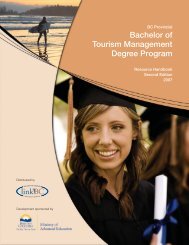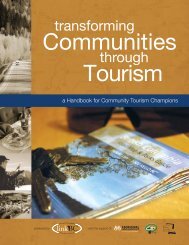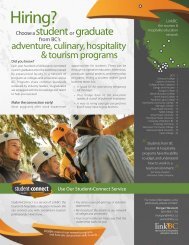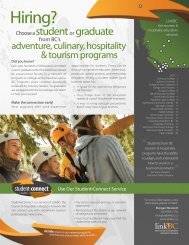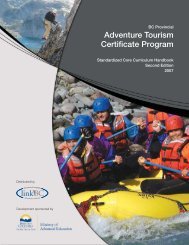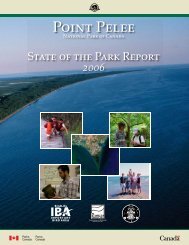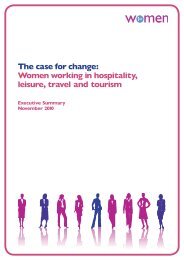Cultural Heritage Tourism Handbook - LinkBC
Cultural Heritage Tourism Handbook - LinkBC
Cultural Heritage Tourism Handbook - LinkBC
- No tags were found...
You also want an ePaper? Increase the reach of your titles
YUMPU automatically turns print PDFs into web optimized ePapers that Google loves.
10. Move Your Strategy ForwardThis concluding chapter discusses potential barriers to moving forward, and provides an introductorylook at strategies for marketing cultural/heritage tourism products. It provides a brief sectionon opportunities to work with colleges/universities, and ideas for ongoing strategy evaluation.10.1 Barriers to Culture and <strong>Tourism</strong> Partnerships<strong>Cultural</strong>/heritage tourism champions need to be passionate, but atthe same time pragmatic. While satisfying, working with cultural/heritage and tourism stakeholders can also yield frustrations. Forinstance, governments at every level may be unable to fund heritageproperty maintenance, or provide low levels of financial support forarts and for cultural enterprises.Culture-tourism partnerships are critical, however, some cultural/heritage and arts organizations may be reluctant to partner withtourism and economic development groups. These concernedcitizens may perceive a move towards tourism as commoditization.They may have never considered how community-based tourismdevelopment can help contribute to the fiscal health of arts andheritage organizations. And they may have been turned off by termssuch as “products”. By the same token, however, carefully chosenwords such as “experience economy”, backed by case studies suchas the ones in this book, can help to bridge the gap between arts/culture and tourism planners.Today’s successfuldestinations—whether urbanor rural, large or small—haveearned attention from theirtarget markets by payingattention to their needs andwants, and providing whatthese markets are looking for.10.2 Involve Your Local Colleges &UniversitiesMany Canadian colleges and universities offer tourism and artseducation and training. When developing a cultural/heritage tourismstrategy, community organizations should consider how theseinstitutions might contribute.A number of these programs offer committed and experiencedfaculty and students to assist with research, development, andpromotional tasks related to cultural/heritage tourism development,which may include:• Undertaking a resident perception survey and analyzing the results.• Contributing to a community tourism inventory.• Completing online research into the current marketing strategiesof competing destinations.• Formulating a marketing and communications strategy for cultural/heritagetourism partnerships.• Developing initial exhibit concepts and design for a culturaltourism attraction.When hiring, consider the graduates of these programs, as they cancomplement the (very necessary) work undertaken by professionalconsultants and other organizations.10.3 Market for Success: SpecialConsiderationsAs a community-based strategy begins to emerge, the attention willsoon turn to marketing. How to fund? What to promote? Who tolead? What themes? What key messages? What approaches to take?This section is not a comprehensive guide to destination marketing(see Learn More for specific resources on marketing), but will giveyou a high-level overview of marketing plan components that couldfollow the development of a local strategy.Promote the Whole Community to Serve DifferentInterestsFor communities, recognizing the overlapping interests of cultural/heritage travellers is important, as is featuring all of a destination’scultural experiences within a single marketing campaign.Being ReadyBefore proceeding with marketing, you must ensure attractions andexperiences being promoted are ready to deliver on the destinationbrand and marketing promise. As you consider individual marketingparticipants, ask yourself if they are47:Export ReadyA business that markets to and through travel trade distributionchannels, understands commission or net rate pricing, and agrees totrade bookings and a cancellation policy. Represents a high degreeof reliability/predictability in offering high-quality visitor experiences.Market ReadyA business that markets to potential visitors in their planning stages,communicates with potential visitors year-round, and is ready toaccept advance reservations.Visitor ReadyA business that has all its licenses, permits and insurance in place,in order to operate legally.It’s important to match the marketing tools and audience with theright product readiness. Higher-end consumers may expect exportreadyexperiences, whereas local and rubber tire (driving distance)guests may be perfectly comfortable with a visitor-ready attraction.7273



